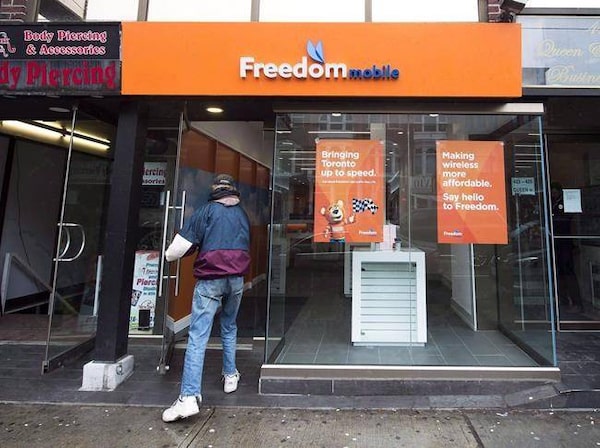Canada’s wireless industry is expected to keep adding new subscribers at a fast pace, but analysts say revenue growth could be slowing as the national carriers respond to increased competition from Shaw Communications Inc.’s Freedom Mobile.
The three biggest telecoms begin reporting second-quarter earnings this week, with Rogers Communications Inc. on Thursday followed by BCE Inc. and Telus Corp. two weeks later.

A man enters a Freedom Mobile store in Toronto on Thursday, November 24, 2016.The Canadian Press
Forecasts suggest the trio will add contract wireless customers in large numbers, continuing a surge in subscribers that has characterized the market over the past two years. That growth has come from the improved economy as well as Canada catching up to other countries on cellphone penetration as more young people and seniors sign up for smartphone service, often with hand-me-down devices.
But financial analysts say the average monthly revenue the Big Three earn from each wireless customer likely isn’t growing as fast as it used to. That’s partly because the incumbents offered deep discounts from their usual prices during a five-day price war in December in response to low-cost plans with lots of mobile data introduced by Freedom Mobile. The effects of so many subscribers switching to cheaper plans are still being felt.
“We forecast a slowdown to 1.7 per cent in the quarter, down from 3.8 per cent a year before,” Desjardins Securities analyst Maher Yaghi predicted in reference to a newly adopted accounting term “ABPU,” or average billing per user. He said that is primarily because of the December discounts as well as Freedom’s entry into the market.
Freedom, which now has 1.3 million customers, has been improving its network and expanding distribution, striking a recent deal to sell its service in 140 Walmart stores, on top of an earlier agreement with Loblaws’ The Mobile Shop.
Related: Canadian telecom companies awaiting spectrum auction prior to 5G rollout
Big Three telecoms say beneficiaries of wireless auction rules are already well-capitalized
Wireless contracts still the biggest source of complaints at telecom commission
Freedom operates in Ontario, British Columbia and Alberta, and Mr. Yaghi said he expects the company’s expansion and network upgrades will reduce ABPU growth in those markets, “as we currently observe lower wireless prices in provinces where four quality players operate versus where there are only three.”
But it will take time, he cautioned, noting Freedom’s “inferior network should help protect the incumbents’ pricing power, at least until Shaw [potentially] launches a [Shaw-]branded service on an improved network later in 2018 or in 2019.”
Another factor in lower ABPU is expensive smartphones now tend to last longer than the typical two-year contract, contributing to an increase in less expensive “bring your own device” plans. That actually boosts carrier profitability though, Mr. Yaghi noted in his report, as they spend less on up-front device subsidies.
Barclays Capital’s Phillip Huang also noted the Big Three have been charging less for bigger data plans at their discount brands (Fido for Rogers, Koodo for Telus and Virgin Mobile for Bell), which “supports our belief that industry ABPU growth will continue to slow in the coming quarters.”
Still, expect to see healthy net wireless additions from the Big Three this quarter, analysts say. Average forecasts suggest Rogers and Telus added around 90,000 new contract customers each in the second quarter.
BCE – which last year won a large contract for mobile service from the government of Canada and is adding additional users under that each quarter – is expected to have attracted more than 100,000.
Shaw reported its latest results last month and added 54,200 subscribers in the period, although that was for its fiscal third quarter and does not compare directly with the Big Three, which report based on regular calendar quarters.
Analysts will also be watching the fight between Rogers and BCE for the Toronto residential market.
BCE recently began a broad advertising campaign for its fibre-to-the-home (FTTH) internet service after connecting more than 60 per cent of households and businesses in the city. Rogers, meanwhile, has been testing its new internet-based television platform with employees ahead of a wider commercial launch.
“All eyes will once again be on Toronto as we should see the initial results of BCE’s marketing offensive to promote its FTTH product in that area,” Mr. Yaghi said.